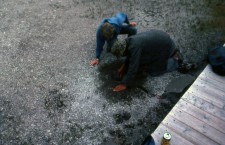In the early 1980s, we got permission to do some "thermal cleanup" on a number of geysers. Cleaning up larger vents is easy, because there's plenty of room to get in and workaround and places to leverage tools.The smaller vents, however, could present a challenge.
Two small vents that we got cleaned out as best we could were Anemone's Third Vent and Penta's Sixth Vent. Both are only a couple of inches across, and almost too small for a human hand.
When I first visited the Upper Basin in the early 1980s, I noticed that when the water levels in the Sawmill Group were high, a spot next to the boardwalk between Penta and Oval was wet. In talking with Marie Wolf, I learned that there once was a small vent there, which supposedly would erupt in conjunction with Penta. When we got the permission to do some cleanup, this was one vent I was determined to see.
By hand, we were a able to quickly expose a circular rim of hard sinter. Some more scooping exposed the trumpet shape of the vent, but down about 4 inches, it was so narrow that you could only grab a pebble at a time. Tongs and bent spoons helped, but our excavation was slow.
As it turned out, the vent itself is only about 6-8 inches deep, with a almost flat floor. To the left (as seen from the boardwalk) there was a small crack about 1 inch wide and maybe two long where water entered. Since lights showed no obstruction, our cleanup on that feature was finished.
In the years since, the vent has to be periodically cleaned out, as there seems to be a type of person who enjoys destroying things, and it only takes a couple swipes with the foot to push in a lot of gravel. Even now it needs some work.
Cleaning at Anemone presented a special challenge, since every seven minutes it would spend a minute refilling every hollow and hole with boiling water, and there's no way to stop it.
Bailing out the water with a bucket was slow and tedious because the bucket was way to big and the area too shallow to allow much water to get in. Smaller glasses worked a little better, but took time. By the time we got most of the water away, the gurgling from Anemone said it was time to stand back.
I don't remember who solved the problem, but the solution was not to bail, but to pour in colder water so as to get the temperature down to a reasonable value. Doing this allowed us to start removing years of gravel and debris from the vent.
Then we were stuck. Wedged into the hole was a rock of some sort. We tried wiggling and prying and pulling by hand, but it wouldn't budge. Finally we used a crowbar to extract a chunk of concrete about the size of a 8oz block of cheese. When Paul Strasser finally triumphantly pulled it out, we were rewarded by the remaining water we'd been working through suddenly draining out of sight.
Unfortunately, Anemone continued to wash debris into the vent, clogging it on its own only about a year later. As this was a natural process, and not the result malicious action, no attempt was made to clean the vent out again. But if you know where to look, you can still see the outline of that vent.

